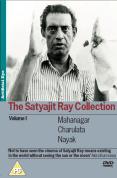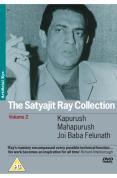![Charulata (1964) (Criterion Collection) UK Only [Blu-ray] [2021]](/pictures/1154690.jpg) Charulata (1964) (Criterion Collection) UK Only | Blu Ray | (05/04/2021)
from £22.98
| Saving you £N/A (N/A%)
| RRP
Charulata (1964) (Criterion Collection) UK Only | Blu Ray | (05/04/2021)
from £22.98
| Saving you £N/A (N/A%)
| RRP This film about a woman's artistic and romantic yearning by SATYAJIT RAY (The Music Room) is set in late nineteenth-century, pre-independence India. It takes place in the gracious home of a liberal-minded, workaholic newspaper editor and his lonely, stifled wife, Charulata (The Big City's MADHABI MUKHERJEE), whose exquisitely composed features mask a burning creativity. When her husband's poet cousin comes to stay with them, Charulata finds herself both inspired by him to pursue her own writing and dangerously drawn to him physically. Based on a novella by the great Rabindranath Tagore, Charulata is a work of subtle textures, a delicate tale of a marriage in jeopardy and a woman taking the first steps toward establishing her own voice. Special Features: New 2K digital film restoration, with uncompressed monaural soundtrack New interview program with actors Madhabi Mukherjee and Soumitra Chatterjee Adapting Tagore, a new interview program featuring Indian film scholar Moinak Biswas and Bengali literature historian Supriya Chaudhuri Archival audio interview with director Satyajit Ray by film historian Gideon Bachmann New English subtitle translation PLUS: A booklet featuring an essay by critic Philip Kemp and a 1980s interview with Ray by his biographer Andrew Robinson
 Satyajit Ray Collection Vol.1 | DVD | (25/08/2008)
from £N/A
| Saving you £N/A (N/A%)
| RRP
Satyajit Ray Collection Vol.1 | DVD | (25/08/2008)
from £N/A
| Saving you £N/A (N/A%)
| RRP Satyajit Ray is internationally acknowledged as one of the great masters of world cinema. His films - many of them masterpieces - have won him legions of admirers among them Akira Kurosawa Henri Cartier-Bresson V.S. Naipaul and Martin Scorsese. This box set features the following films: Mahanagar (Aka: The Big City) (1963): Set in the mid '50s Ray's often humorous story of conflicting social values in India's lower-middle class stars Madhabi Mukherjee as a housewife whose growing independence alarms her traditionalist India 1963 family. Charulata (Aka: The Lonely Wife) (1964): Neglected by her ambitious journalist husband the lonely Charulata (Madhabi Mukherjee) befriends his cousin (Soumitra Chatterjee) a sensitive aspiring writer and almost inevitably their feelings for each other begin to deepen. Adapted from a story by Rabindranath Tagore Ray considered this sesnitively realised drama one of his finest achievements. Nayak (Aka: The Hero) (1966): This beautifully observed character study was one of Ray's earliest original screenplays. En route to an award ceremony a famous and egocentric Bengali movie star finds that he is compelled to re-evaluate his life after encountering a disapproving young journalist (Sharmila Tagore).
 The Satyjit Ray Collection Vol.2 | DVD | (22/09/2008)
from £N/A
| Saving you £N/A (N/A%)
| RRP
The Satyjit Ray Collection Vol.2 | DVD | (22/09/2008)
from £N/A
| Saving you £N/A (N/A%)
| RRP Satyajit Ray's artistic legacy is one of the most formidable in all of film history. Exceptionally versatile his films covered almost every conceivable genre winning him nearly every major cinema award including an Oscar for lifetime achievement. Titles Comprise: Kapurush (a.k.a The Coward) (1965): Stranded in a small town screenwriter Amitabha Roy is astonished to encounter a former lover who is now married to the owner of a tea plantation. Recalling his inability to commit to her and the relationship's resultant breakdown Roy decides to make amends for the past. Mahapurush (a.k.a The Holy Man) (1965): Ray's rarely-seen gem is a comedy-drama in which a gullible and religiously devout retiree is completely taken in by a bogus holy man and enlists the charlatan's help in finding his daughter a husband. But she is being courted by a young man who determines to expose the fraudster. Joi Baba Felunath (1978): Set in the holy city of Benares where Ray had shot Aparajito over 20 years previously this adventure story adapted from Ray's own novel stars Soumitra Chatterjee as a detective investigating the theft of a priceless gold icon.
![Charulata [DVD]](/pictures/1121722.jpg) Charulata | DVD | (24/06/2013)
from £21.58
| Saving you £N/A (N/A%)
| RRP
Charulata | DVD | (24/06/2013)
from £21.58
| Saving you £N/A (N/A%)
| RRP ![Charulata [Blu-ray]](/pictures/1121696.jpg) Charulata | Blu Ray | (26/08/2013)
from £26.98
| Saving you £-6.99 (-35.00%)
| RRP
Charulata | Blu Ray | (26/08/2013)
from £26.98
| Saving you £-6.99 (-35.00%)
| RRP Neglected by her ambitious journalist husband the lonely Charulata befriends his cousin a sensitive aspiring writer and almost inevitably their feelings for each other begin to deepen. Adapted from a story by Rabindranath Tagore Ray considered this sensitively realised drama one of his finest achievements.
 Charulata | DVD | (17/04/2006)
from £N/A
| Saving you £N/A (N/A%)
| RRP
Charulata | DVD | (17/04/2006)
from £N/A
| Saving you £N/A (N/A%)
| RRP Charu lives a lonely and idle life in 1870s India. Although her husband devotes more time to his newspaper than to their marriage he sees her loneliness and asks his brother-in-law Umapeda a would-be writer to keep her company. At this point Bhupati's cousin Amal visits and spends a long vacation and after several months Charu and Amal's feelings for each other move beyond friendship.
![The Big City [Blu-ray]](/pictures/1123511.jpg) The Big City | Blu Ray | (09/09/2013)
from £N/A
| Saving you £N/A (N/A%)
| RRP
The Big City | Blu Ray | (09/09/2013)
from £N/A
| Saving you £N/A (N/A%)
| RRP Set in the mid '50s Ray's often humorous story of conflicting social values in India's lower-middle class stars Madhabi Mukherjee as a housewife whose growing independence alarms her traditionalist family.
![The Coward (Kapurush) [Blu-ray]](/pictures/1122648.jpg) The Coward (Kapurush) | Blu Ray | (26/08/2013)
from £N/A
| Saving you £N/A (N/A%)
| RRP
The Coward (Kapurush) | Blu Ray | (26/08/2013)
from £N/A
| Saving you £N/A (N/A%)
| RRP Stranded in a small town a screenwriter is astonished to encounter a former lover now married to the owner of a tea plantation. Recalling his inability to commit to her and the relationship's resultant breakdown Roy attempts to make amends for the past but finds time hasn't healed the wounds.
 Kapurush | DVD | (07/08/2006)
from £N/A
| Saving you £N/A (N/A%)
| RRP
Kapurush | DVD | (07/08/2006)
from £N/A
| Saving you £N/A (N/A%)
| RRP On his way to Hanshimara to collect material for a film story Amitabha Roy's taxi has a breakdown and he is offered hospitality for the night by Bimal Gupta a local tree planter. Bimal's wife Karuna turns out to be Amitabha's one time love. In the course of the evening Amitabha realizes that Bimal and Karuna's marriage cannot be a happy one. Amitabha even wants to take Karuna away and atone for his past betrayal. But Karuna refuses. Next morning they plan to go out on a picnic but Bimal falls asleep and the plan gets bungled. Amitabha scrawls a hasty note to Karuna that he will wait for her in the station. Amitabha waits till the last minute only to see Karuna come to the station asking for her phial of sleeping tablets.
![Utsab [2001]](/pictures/1006131.jpg) Utsab | DVD | (01/11/2006)
from £N/A
| Saving you £N/A (N/A%)
| RRP
Utsab | DVD | (01/11/2006)
from £N/A
| Saving you £N/A (N/A%)
| RRP The two middle-aged daughters of Bhagabati gather with their families in their old home to celebrate Durga Puja. But what seems like a celebration is in fact a seething cauldron of family tensions as each daughter brings along her own baggage of problems. Parul the eldest daughter sees a possible repeat of her own tragic past as she watches her elder son Joy attracted to her niece Shampa. Bhagabati's younger son Asit faces the possibility of losing his job after the Puja something h

Please wait. Loading...
This site uses cookies.
More details in our privacy policy